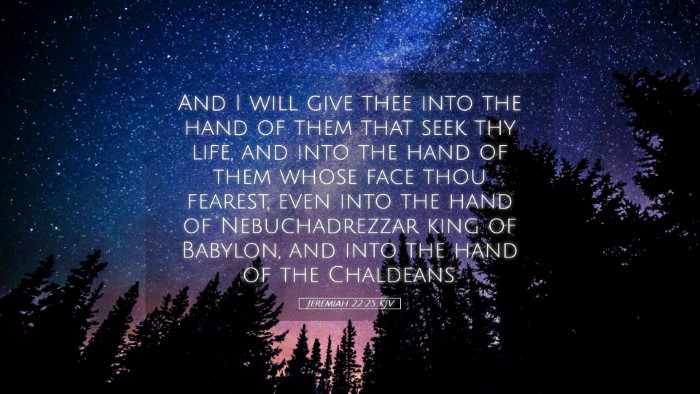Commentary on Jeremiah 22:25
Bible Verse: "And I will give thee into the hand of them that seek thy life, and into the hand of them whose face thou fearest, even into the hand of Nebuchadnezzar king of Babylon, and into the hand of the Chaldeans."
Contextual Background
This verse is part of a larger passage in Jeremiah where the prophet addresses the king of Judah, Jehoiakim. He highlights the impending judgment and the consequences of the king's actions. The socio-political environment during this time was tumultuous, with Babylon rising to power and posing a significant threat to Judah.
Matthew Henry's Commentary
Matthew Henry emphasizes the sovereignty of God in orchestrating events for His purposes. He notes that the impending doom for Jehoiakim was a direct result of his sinful reign. Henry states, "God will give you into the hands of those you fear, showing that your power is futile against the divine authority." This encapsulates the gravity of ignoring God’s commandments, as Jehoiakim's leadership was marked by rebellion and idolatry.
Henry further elaborates that this statement illustrates the principle of divine retribution, which operates both nationally and personally. When leaders turn away from God, they not only jeopardize their fate but also that of their people.
Albert Barnes' Commentary
Albert Barnes provides a critical insight into the significance of Nebuchadnezzar as an instrument of God’s judgment. He asserts that God often utilizes foreign powers to execute His will: "The king of Babylon was both a literal and symbolic representation of God’s means to bring about consequences for disobedience." This suggests that God’s reach extends beyond the temporal and visible, revealing a divine order in history.
Barnes also notes the specific mention of fear," the fear of those from whom one ought to expect protection. This grim realization highlights the futility of relying on human strength against divine judgment, driving home the point that true security lies in obedience to God.
Adam Clarke's Commentary
Adam Clarke explores the psychological implications for Jehoiakim. He explains that the king's betrayal of God had put him in a place of vulnerability where he would inevitably become a pawn in the hands of his enemies. Clarke notes, "God takes away the protection of those who turn away from Him, giving them into the hands of those they dread." This insight serves as a sobering reminder to current leaders about the spiritual responsibility that comes with authority.
Clarke also highlights the grace amidst judgment, emphasizing that even in this prophetic warning, there is an opportunity for repentance. The narrative stands as a testament to the boundless mercy of God, who desires His people to return to Him.
Theological Insights
- The Sovereignty of God: This verse exemplifies the overarching control God has over history, demonstrating that earthly powers are ultimately subordinate to His will.
- Divine Justice: The notion of judgment reflects God's justice system. Just as He withholds blessings in the face of rebellion, He also enacts penalties for disobedience.
- National Implications: Strong leadership grounded in faith can lead to societal blessings, while a pull away from God can lead to national disgrace and disaster.
- Call to Repentance: The passage calls believers not just to acknowledge God’s judgment but also to embrace His grace, highlighting the possibility of reconciliation through repentance.
Conclusion
In Jeremiah 22:25, the warning to Jehoiakim serves as a powerful reminder of the principles that govern our relationship with God. Through the commentaries of Henry, Barnes, and Clarke, we gain a multifaceted understanding of the text. It urges contemporary readers, especially leaders, to heed the call to align their leadership with divine principles, ensuring that their reign reflects justice, mercy, and faithfulness to God's covenant.
This scripture remains relevant, serving as both a warning and an encouragement to recognize the divine hand at work in our lives and nations, and a clarion call to return to foundational truths that foster peace and righteousness.


